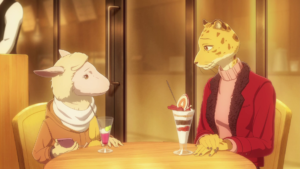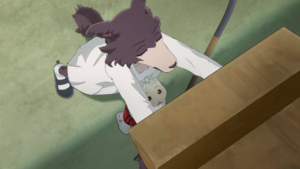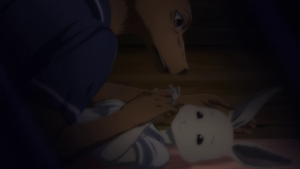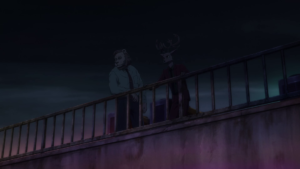After the big reveal in episode 7, we go away from Riz for a more mundane school life story. I’m quite amused by how Legosi gives very little attention to Tem’s killer this week, and like I mentioned in my last post Beastars has this “one-minded” and oblique approach to it. It’s apparent in the way that after the big events, everything just reverts back to normal like nothing ever happened (the end of season 1 to the beginning of this season is one prime example). It’s visible in the way that some characters just disappear for a while and then pop back like normal and it’s apparent in the way Beastars keeps changing the focus from the murder mystery to the school events to the star-crossed love. The shift is jarring at times, but looking deeper it fits to the context of its universe. The normalness of Cherryton Academy is just the facade for the unspeakable tension between the carnivores and herbivores. It’s a crack beneath the beautiful pie which gives you a faux sense of peace on the surface, but crack through it and you can see the tension boiling up.
And the short sweet one-off segment of Shiira the leopard and Peach the sheep further examines that sentiment. Here in Cherryton, it’s trendy to have a selfie of carnivores and herbivores together, and Shiira isn’t comfortable with that as she thrives for more intimate relationships. Comes her sudden impulses of inviting Peach for their shopping mall trip and their bond over the dress code. This segment might be unrelated to what Legosi and the cast has been going through, but it’s a perfect examination of the carnies-herbies relationship and their attempt to go over that facade.
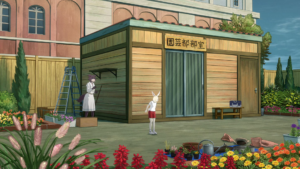
If there is a common theme for this episode, it’s “female cast’s encounters”, given it’s the first time our female leads have a chance for a real conversation. Haru has made little appearance in this season, but once she’s there she’s something else. I just love everything she does this week: first she casually grabs Juno to help her with the garden, then she tells Juno not to mention Legosi’s name and just enjoys girls’ time together. What I love the most is how she easily brushes off Juno’s perception of her. “You’re so small and helpless. That must be why Legosi is attracted to you” – and she responds to that with a casual sneeze. If we didn’t learn about how she hates to be called small and helpless before, we wouldn’t know based on her reaction. For me this casual remark is where Beastars excels on addressing its prejudice themes. What Juno says (and what she regards to the carnies-herbies before meeting Haru) may appear to be a harmless judgement but it’s a clear generalization and prejudice towards Haru’s dwarf nature.Juno has no intention to belittle Haru for sure, but this is an unconscious bias and sometimes it’s much more dangerous than the vocal ones because to change it you have to change the whole mindset of the person.
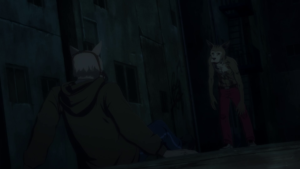
We have little scenes of Legosi and Louis but they are both going through some significant changes. For Legosi, it’s the first time we see the “meat-addicted” beings – like someone who is under the influence they suck every last bit of the bone and could commit “murder”/ devour to living things. Beastars certainly isn’t afraid to go dark territory here, and it’s such unsettling to see a beast who has given up for meat-addiction. Louis, on the other hand, develops a bond with his second-in-command Ibuki: a kind of father-son relationship that both never had before. He receives a call from Haru, but he’s already let go of his past. Beastars might sometimes feel a bit heavy-handed and obvious about its herbivores-carnivores relationship (noted how many times I used this term in this review), but I can’t deny that there are some serious thought-provoking layers of commentaries that Paru Itagaki has infused in this fury furry world.

